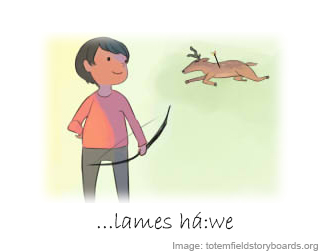Lámes há:we means ‘…if/when he goes hunting’.
Vocabulary and Pronunciation
- lám – ‘to go’ – sounds like ‘LAMB‘.
- -es – ‘if/when he … – sounds like ‘us‘
- há:we – ‘hunting’ – sounds like ‘HOW-uh‘ (this is the ‘ing‘ form of háwe)
Audio: Elizabeth Herrling
Structure
The structure of this phrase is as follows:
Notes:
- The -es ending in this case indicates that ‘he‘ (or ‘she‘ or ‘it‘) is doing the action. Speakers only use this special form of -es for ‘he‘ when they are talking about a condition such as ‘if‘ or ‘when‘. So one way to translate lames is ‘if/when he goes‘.
- Note that há:we, with the colon after the vowel, indicates the ‘ing’ form hunting. You make há:we with slight vowel lengthening (a:), but more importantly with a sharply falling pitch.



No comments yet.